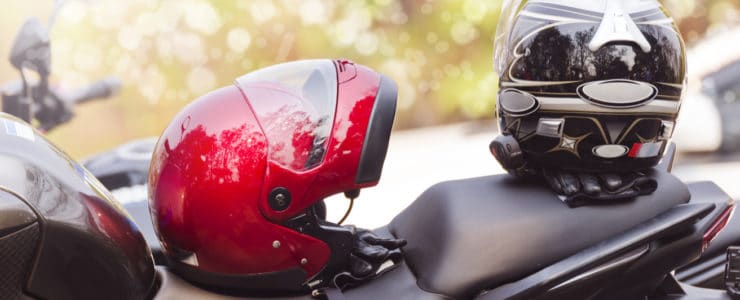
Chapter 486 of the Nevada Revised Statutes pertains to motorcycles and other such vehicles. These other types of vehicles may include a trimobile, moped, three-wheeled motorcycle, and more. Much like the Rules of the Road, Chapter 486 has many laws within it.
What Does Nevada’s Motorcycle Helmet Law Say
NRS 486.231 has to do with the standards of wearing helmets, other types of headgear as well as glasses. It reads as follows:
NRS 486.231 – Protective headgear and glasses: Standards; when use required.
1. The Department shall adopt standards for protective headgear and protective glasses, goggles or face shields to be worn by the drivers and passengers of motorcycles and transparent windscreens for motorcycles.
Here is where the law lays the groundwork for the rest of the points that are listed within it.
As it begins to lay out, this statute will deal with headgear used for safety purposes, eye wear or face shields and windscreens. As it states the windscreens must not be tinted as only clear and transparent ones are acceptable.
Protective Headgear Should Be Securely Fastened
The second point of this NRS reads:
2. Except as provided in this section, when any motorcycle, except a trimobile or moped, is being driven on a highway, the driver and passenger shall wear protective headgear securely fastened on the head and protective glasses, goggles or face shields meeting those standards. Drivers and passengers of trimobiles shall wear protective glasses, goggles or face shields which meet those standards.
Point one dictated to the citizens of Nevada what this law was regarding now point number two is stating ‘the how’.
As you have read, the helmet or other type of headgear must be securely fastened. In other words, a rider can’t simply have a helmet on their head, there must be a strap. If an unfastened strap is seen by law enforcement they can issue a traffic ticket.
If you are ever given a ticket of any kind you are welcome to stop by the downtown office of Ticket Busters for legal help.
Straps can come in a variety of forms making a violation of this part of the statute somewhat subjective. In many scenarios, a good attorney would be able to argue against this violation if a strap was present at the time of the citation. It can be difficult for a traffic officer to truly know if a strap was fastened completely or not.
If readers were feeling overwhelmed by the first two points they will get a reprieve on the next few as Nevada lawmakers ‘give some back to the little guy’. The first two can be considered intrusive with the Government instructing people what to wear to protect themselves.
When Can You Not Wear Safety Goggles or Glasses
The next few sub points are to the contrary:
3. When a motorcycle or a trimobile is equipped with a transparent windscreen meeting those standards, the driver and passenger are not required to wear glasses, goggles or face shields.
Many people sigh when they hear, read or find out about laws because they usually require them to do more. Although NRS 486.231 is no different, this point does quite the opposite.
So if there is an unshaded windscreen installed on the motorcycle that fit the parameters of the law then the riders do not have to wear any type of safety goggle or other types of eyewear or facial shield.
Further Exceptions to Wearing Protective Headgear
Parts four and five continue on with the concessions for motorcycle riders:
4. When a motorcycle is being driven in a parade authorized by a local authority, the driver and passenger are not required to wear the protective devices provided for in this section.
This part should be obvious because if a motorcycle is being driven in a parade they are most likely not driving fast and therefore not endangering themselves or anyone else. Because of this reason, the riders do not need to wear any protective wear.
For people who feel as if the laws in Nevada are unreasonable, this point would show that not every law is set up that way.
5. When a three-wheel motorcycle on which the driver and passengers ride within an enclosed cab is being driven on a highway, the driver and passengers are not required to wear the protective devices required by this section.
Again, this last point (#5) shows that lawmakers in Carson City were trying to be reasonable when drafting this statute. When a three-wheeled vehicle has an enclosed cab and people are riding in it they do not have to wear anything protective. In this case, the cab is providing protection much like a car would do.
Ticket Busters has been assisting the residents of Las Vegas and southern Nevada for many years with their tickets. Regardless of what Nevada Revised Statute was violated or whose fault it was we can help. Our staff speaks Spanish and will get you hooked up with one of our legal professionals to work your case.
What if I Do Not Wear a Helmet and Am Injured?
Not wearing a helmet could impact a personal injury motorcycle claim. It really depends though based on the injuries that actually occurred. If there is an injury involving the head and a helmet was not being worn, it could be construed by the law that the motorcycle was the cause of the injury and not the other party.
This may not sound proper but because Nevada has this law (NRS 486.231) that instructs motorcyclists to wear a helmet, it is essentially their fault if they were hurt while not adhering to the statute.
Similar to NRS 484D.495(4)(b) which pertains to seat/safety belts and states that not wearing one “may not be considered as negligence or as causation in any civil action or as negligent or reckless driving under NRS 484B.653”.
Because both the seat belt and a helmet provide similar functions (to provide safety to the individual) some prosecutors or the court system might put the blame on the helmetless rider for their injuries. If there were injuries in a motorcycle accident where the driver of the cycle was injured but did not suffer a head injury then it really becomes pointless whether or not that person was wearing a helmet.
After reading through this article, it should be quite obvious that this law is very controversial. Many people feel that it is government overreach.
When boiled down, this law dictates how someone has to dress themselves by making it a law that they must wear certain items. Many would not prefer a law that tells people what shoes to wear in the summertime. Some people like to wear sandals in the scorching summer heat of Nevada whereas some people do not.
There is a certain segment of people that do not want the Government telling them what to do. The opposing side might argue that forcing a motorcycle riders to wear a helmet is in their best interests of them because if there is a crash it may prevent significant injury or death. Again though, the people riding a motorcycle know the risks of doing so and if they get injured it is their own consequence.
More freedom-minded people will say “live and let live”. Drilling down on this law can become a slippery slope. If the government deems driving a motorcycle without a helmet too dangerous for the individual where do they stop? They could potentially deem that driving a car on the highway is too dangerous based on collision data. Regardless of whether or not you believe this law to be government overreach or not it is still the law and it must be followed.
If you were issued any kind of ticket pertaining to not wearing a helmet while riding a motorcycle please reach out to Ticket Busters.
As we have discussed earlier in this article, there are many moving pieces and variables to this statute. Even though it is written in stone, many other defenses and details of your specific case can likely be presented which could help contribute to getting your ticket reduced or possibly thrown out completely.
Stilwell vs. Clark County Case
There was a court case from 2014 that pertained to this NRS. This case involved a group of motorcycle riders in Nevada who challenged the statute alleging that law enforcement officers were not properly trained in identifying protective headgear and their compliance with the law.
Because of this lack of training, the defendants alleged that the plaintiffs violated the constitutional rights of the citizens of Nevada.
Due to their lack of knowledge in motorcycle headgear training, they were accused of engaging in practices and patterns of discriminatory enforcement which was evident by the citations they issued.
The plaintiffs stated that the citations were given without probable cause. The plaintiffs’ claims were dismissed with prejudice. The lawsuit really pertained to the 4th Amendment (“Search & Seizure”) but was related to NRS 486.231. In the end, it was ruled that the plaintiffs did not have a case against the defendants.



